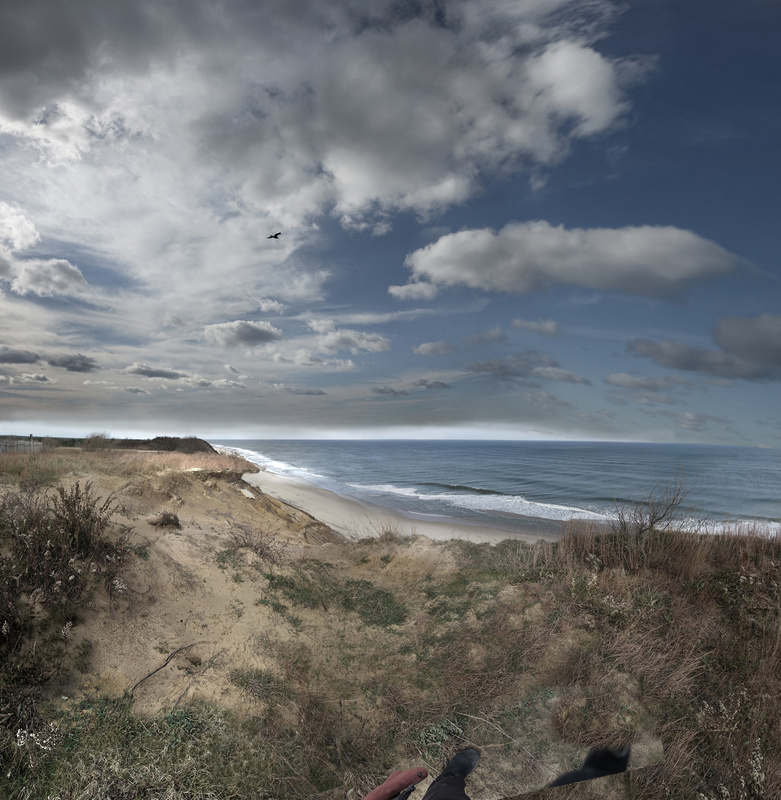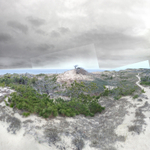The Highland Light (#5)

In 1996 the Highland Lighthouse in North Truro was moved 450 feet because of cliff erosion. Originally completed in 1797 it had undergone modifications over the decades and was being rebuilt when Thoreau visited. Thoreau's Highland Light essay was published posthumously in The Atlantic Monthly in 1864. The publication of ten chapters compiled by Thoreau's sister Sophia and close friend Ellery Channing became the book "Cape Cod" in 1865. Channing was the unnamed companion in Thoreau's Cape essays.
I go to Highland Light knowing that Thoreau had taken in this panorama with his body and intellect. I wander this cliff edge and am thinking the view has not changed since he visited, or at least I can say with some certainty it was more the same than different. As I stare outward I allow myself to be pulled back into the present with rhythmic sounds echoing the motion in my chest.
Thoreau was very aware of the erosion of the Cape Cod shoreline and spoke about it in detail in relation to this lighthouse. "Even this vast clay bank is fast wearing away." And later in this passage "..and in one place the bank is curiously eaten out in the form of a large semicircular crater." I am prompted to notice in my image a rounded bite that drops off at the edge. Using survey techniques Thoreau methodically calculated cliff heights and speculated on erosion rates.
But the emotional impact of this landscape swings the pendulum.
Thoreau drops observations in the sand for the reader to collect. He offers deadly riptides, and youths hoping to outrun rising waters only to be killed by a collapsing cliff bank. He shares a report of two dead bodies come ashore from the wrecked St. John, one being headless.
But wait ... .... ... For then, a sparkling day will inspire Thoreau to write that he has found "an autumnal landscape of extraordinary brilliancy, a sort of Promised Land on the one hand, and the ocean on the other."
Thoreau's mood shifts come as fast as the changing skies and there might not be a hotel lobby bar to retreat to...
In an epiphany reminding me of the famous "Contact!" passage in The Maine Woods Thoreau describes his experiences with "the Cape under me as if I were riding it bare-backed having found it all outdoors, huge and real Cape Cod!" In another passage, the exhilarating landscape makes a drastic left turn. "As we looked off and saw the water growing darker and darker and deeper and deeper the farther we looked till it was awful to consider...."
After his initial visit in 1849, Thoreau returned 3 times to ride the bucking waves of this coastline. Thoreau was not afraid to throw himself against the void of this abstract destiny and seemed to relish in the plucking, chewing, and swallowing of all he encountered. This wild place was having a significant impact on him in ways I can only speculate about.
I go to Highland Light knowing that Thoreau had taken in this panorama with his body and intellect. I wander this cliff edge and am thinking the view has not changed since he visited, or at least I can say with some certainty it was more the same than different. As I stare outward I allow myself to be pulled back into the present with rhythmic sounds echoing the motion in my chest.
Thoreau was very aware of the erosion of the Cape Cod shoreline and spoke about it in detail in relation to this lighthouse. "Even this vast clay bank is fast wearing away." And later in this passage "..and in one place the bank is curiously eaten out in the form of a large semicircular crater." I am prompted to notice in my image a rounded bite that drops off at the edge. Using survey techniques Thoreau methodically calculated cliff heights and speculated on erosion rates.
But the emotional impact of this landscape swings the pendulum.
Thoreau drops observations in the sand for the reader to collect. He offers deadly riptides, and youths hoping to outrun rising waters only to be killed by a collapsing cliff bank. He shares a report of two dead bodies come ashore from the wrecked St. John, one being headless.
But wait ... .... ... For then, a sparkling day will inspire Thoreau to write that he has found "an autumnal landscape of extraordinary brilliancy, a sort of Promised Land on the one hand, and the ocean on the other."
Thoreau's mood shifts come as fast as the changing skies and there might not be a hotel lobby bar to retreat to...
In an epiphany reminding me of the famous "Contact!" passage in The Maine Woods Thoreau describes his experiences with "the Cape under me as if I were riding it bare-backed having found it all outdoors, huge and real Cape Cod!" In another passage, the exhilarating landscape makes a drastic left turn. "As we looked off and saw the water growing darker and darker and deeper and deeper the farther we looked till it was awful to consider...."
After his initial visit in 1849, Thoreau returned 3 times to ride the bucking waves of this coastline. Thoreau was not afraid to throw himself against the void of this abstract destiny and seemed to relish in the plucking, chewing, and swallowing of all he encountered. This wild place was having a significant impact on him in ways I can only speculate about.

|















